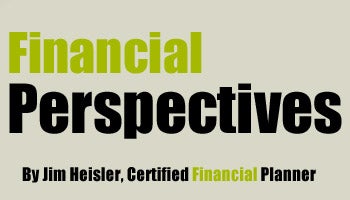Financial Perspectives: Tips you should jump on

This week we are addressing a number of planning areas. Each of the planning areas is summarized and then we provide a tip that you should look to implement as part of own your financial review.
Do You Have Enough Life Insurance?
We hear stories all the time about a terrible accident or a young person dying from some terrible disease. Every time you hear something like this, it makes you question your own mortality. How would your family make it if your income were lost? Many people carry insurance coverage through their employer, but in many cases it is insufficient. The coverage also ends if you leave your job or are laid off. Purchasing a policy on your own is one of the best ways to protect your family if you were to lose your job. In some instances, the cost to purchase a policy can be cheaper than the cost of participating in the group insurance program at work.
Financial Planning To-Do This Week: Review the life insurance coverage you have (amount and cost of coverage) and make an appointment to sit down with an insurance professional to do a complete life insurance review. Remember, the most critical time for insurance is while your children are still living at home (in school or college).
Disability Insurance for All
It may be hard to think about what would happen if you were hurt in a car accident or developed an illness that left you unable to work for an extended period of time. Unless the incident happened at work, you could lose your ability to earn an income. How do you protect against this? Disability insurance. This type of insurance coverage is normally offered as a benefit through your company’s benefit program. . . usually at a cost to you. The coverage can be very beneficial because it will provide for the replacement of a certain percentage of your salary up to a stated time period, which could last for a few years or up to age 65.
Financial Planning To-Do This Week: If you are not already participating in this type of coverage, make it a point to find out what your employer offers. Inquire about the costs and policy guidelines and strongly consider signing up at your earliest opportunity. If you are self-employed or your employer does not offer the coverage, consult with an insurance professional to find coverage that would be good for you.
Get Rid of Credit Card Debt
The root of most financial problems stems from having too much credit card debt. For years, credit card companies bombarded the market with all types of credit card offers (even unemployed college students could easily get credit cards). The problem of extending credit to people who could not pay it back was that a large number of them would find up defaulting on their debt, or they would put themselves into a long-term financial spiral that would be hard to get out of.
Financial Planning To-Do This Week: Review all of your credit cards and determine which ones have the interest rates. Then consider transferring the balance to lower interest rate cards offered by a credit union. Next begin paying as much as you can on the card with the highest rate and just the minimum on the others until the highest is paid off. Then transfer the payment to the next highest rate card and continue the cycle from there.
No Matter What – Invest!
In today’s environment, it is hard to think about what you need to do to get ahead. One thing that always seems to be consistently true is that you need to pay yourself first. Many think that those with wealth were either born into it or become successful business people or professionals. While this may be true for percentage of those with wealth, there is an equally large percentage of folks who built their wealth over time. You do this incrementally by paying yourself every time you get paid.
Financial Planning To-Do This Week: Set a savings percentage rate for yourself; with every paycheck set aside this money (5 to 15 percent). Then set up an investment account with a low-cost mutual fund company in a very diversified fund. All companies offer automatic investment plans where the money can be electronically transferred from your checking account into the fund of your choice. The benefit of this is that you will be dollar-cost averaging into the fund you select and will be building wealth for the future that will hopefully earn more than what you will get from any bank accounts.
Good luck with your planning!
The views expressed are not necessarily those of Cambridge and should not be construed as an offer to buy or sell any security.
Jim Heisler, CFP®, CDFA™, CASL™ Family Wealth Services, LLC 8725 Frankford Avenue Philadelphia, PA 19136 jim@familywealthservices.net 215-332-4968
Jim Heisler is a Certified Financial Planner with Family Wealth Services in Holmesburg. You can read all his Financial Perspective columns here.
WHYY is your source for fact-based, in-depth journalism and information. As a nonprofit organization, we rely on financial support from readers like you. Please give today.






